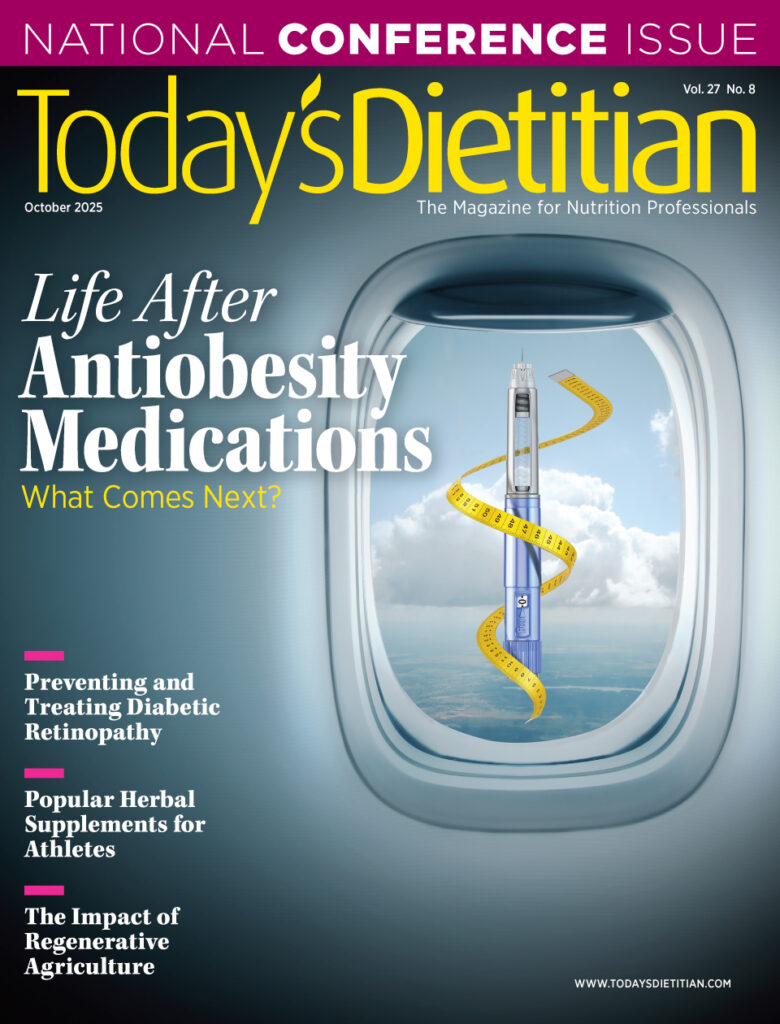Today’s Dietitian
Vol. 19, No. 1, P. 8
Does this sea veggie live up to the hype?
Q: Many clients are asking me about spirulina and its purported health claims. What is spirulina, and does it provide any proven health benefits?
A: Spirulina is a type of blue-green algae that inhabitants of Central Africa have been consuming for centuries. It grows in warm alkaline waters in areas with mild climates, where it absorbs a variety of nutrients from its surrounding area. Based on its nutrient content, spirulina is being used as a nutraceutical and touted for providing health benefits, including boosting heart health and the immune system and containing antiviral and anticancer properties. However, there’s more to spirulina than consumers may realize. That’s why it’s important for nutrition professionals to stay abreast of the latest spirulina research.
Nutrient Content
According to the USDA Nutrient Database, 1 tablespoon dried spirulina contains 20 kcal, 1 g total fat, 2 g total carbohydrates, and 4 g protein. It’s an excellent source of copper (21% DV) and a good source of thiamin (11% DV), riboflavin (15% DV), and iron (11% DV).1 It also contains omega-3 fatty acids (57.6 mg) and omega-6 fatty acids (87.8 mg), with part of the omega-6 coming from gamma-linolenic acid.
Buying Spirulina
Spirulina is sold in tablet, powder, and liquid extract form. When purchasing the tablets, recommend clients look for binders, which some manufacturers add to hold the spirulina powder together. Spirulina powder can be added to smoothies, juices, and baked goods. Food companies also have begun adding it to foods such as Go Raw Sweet Spirulina Sprouted Bites and Shanti Spirulina Detox Bars, and exaggerating the health benefits of the algae.
Generally, spirulina is considered safe for human consumption, but it can absorb heavy metals from the water in which it’s grown and therefore be contaminated with toxic substances. Cyanobacteria, blue-green bacteria that share an environment with spirulina, produce toxins that are released upon death or lysis. One toxin in particular, called microcystin, is of most concern, as it’s a hepatotoxin—a chemical substance that damages the liver. Adverse effects of consuming contaminated spirulina include stomach pain, nausea, vomiting, weakness, liver damage, thirst, rapid heartbeat, shock, and death.2 Therefore, it’s important to purchase a trusted spirulina brand from a reputable company that tests its products for contaminants.
Research
Numerous preclinical studies have demonstrated the antioxidant and anti-inflammatory activity of spirulina.3 Preclinical trials conducted on animals found that spirulina may help reduce cholesterol. In a 1990 study, researchers induced hyperlipidemia with a high-fructose diet in rats.4 Then they gave the rats increasing percentages of spirulina (5%, 10%, and 15%), to which the researchers attributed significant improvement in lipid profiles. Between 1980 and 2008, numerous clinical studies examined the effects of spirulina on hyperlipidemia and found a positive correlation; however, sample sizes were very small.3
A 2011 study examined the effects of a spirulina supplement on anemia and immune function in older adults.5 Researchers found a positive correlation in the small sample size (n = 30), but they said larger human studies are needed.
Studies also have found anticancer and antiviral effects of spirulina. A 2014 study examined the effects of spirulina on in vitro human pancreatic cancer cells. Researchers found that therapeutic doses of spirulina inhibited cancer cell growth.6 A 2002 study using spirulina extract found antiviral activity, especially against herpes simplex virus type 2.7
Bottom Line
Numerous preclinical studies on spirulina have been conducted, dating back to the 1980s. However, many studies have used animals or a small number of human subjects. More research is needed using a large human sample size to determine its true effects.
If clients want to take spirulina supplements or eat foods containing spirulina, RDs should communicate the weaknesses of the claims surrounding the efficacy of spirulina supplements and note the need for further research. Furthermore, the client should be advised to purchase spirulina from a reputable manufacturer that tests its products for contaminants.
— Toby Amidor, MS, RD, CDN, is the founder of Toby Amidor Nutrition (http://tobyamidornutrition.com) and the author of the cookbook The Greek Yogurt Kitchen: More Than 130 Delicious, Healthy Recipes for Every Meal of the Day. She’s also a nutrition expert for FoodNetwork.com and a contributor to US News Eat + Run, MensFitness.com, and Muscle & Fitness.
References
1. US Department of Agriculture, Agricultural Research Service. US National Nutrient Database for Standard Reference. https://ndb.nal.usda.gov/ndb/. Updated May 2016. Accessed November 8, 2016.
2. Microcystins. US Environmental Protection Agency, Drinking Water Treatability Database website. https://iaspub.epa.gov/tdb/pages/contaminant/contaminantOverview.do?contaminantId=-1336577584. Accessed November 8, 2016.
3. Deng R, Chow TJ. Hypolipidemic, antioxidant, and antiinflammatory activities of microalgae Spirulina. Cardiovasc Ther. 2010;28(4):e33-e45.
4. Iwata K, Inayama T, Kato T. Effects of Spirulina platensis on plasma lipoprotein lipase activity in fructose-induced hyperlipidemic rats. J Nutr Sci Vitaminol (Tokyo). 1990;36(2):165-171.
5. Selmi C, Leung PS, Fischer L, et al. The effects of Spirulina on anemia and immune function in senior citizens. Cell Mol Immunol. 2011;8(3):248-254.
6. Koníčková R, Vaňková K, Vaníková J, et al. Anti-cancer effects of blue-green alga Spirulina platensis, a natural source of bilirubin-like tetrapyrrolic compounds. Ann Hepatol. 2014;13(2):273-283.
7. Hernández-Corona A, Nieves I, Meckes M, Chamorro G, Barron BL. Antiviral activity of Spirulina maxima against herpes simplex virus type 2. Antiviral Res. 2002;56(3):279-285.


